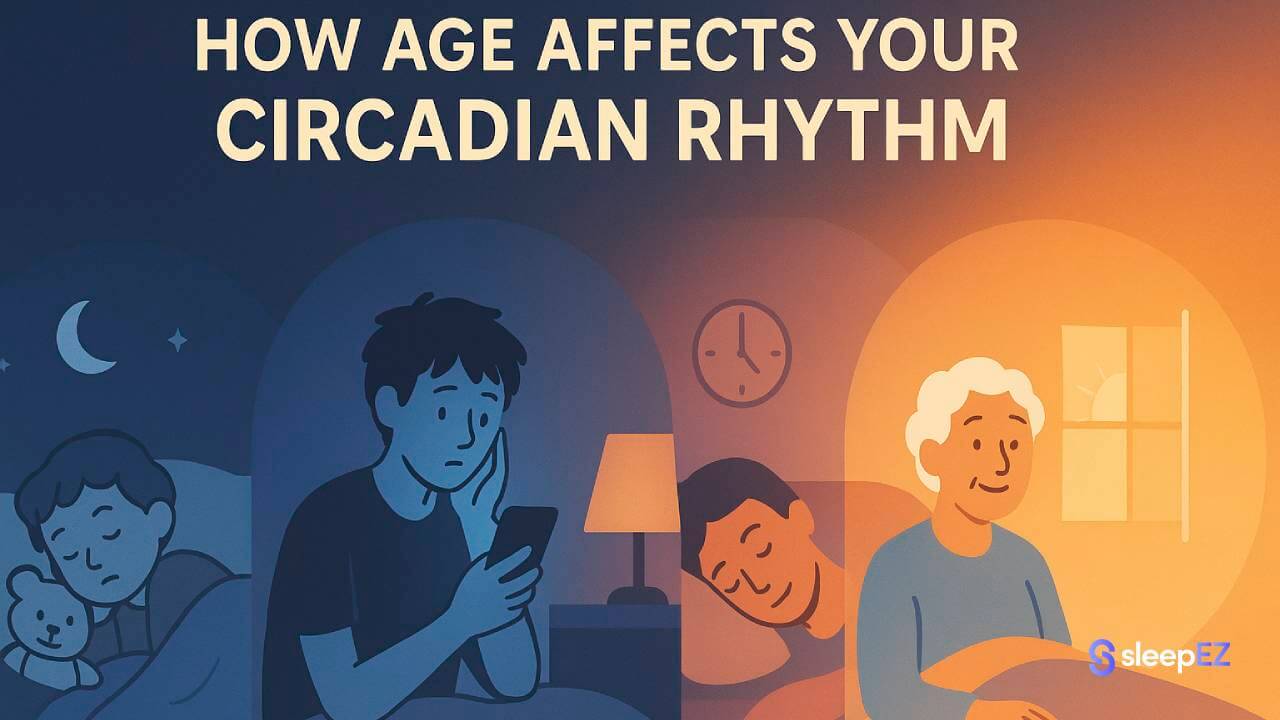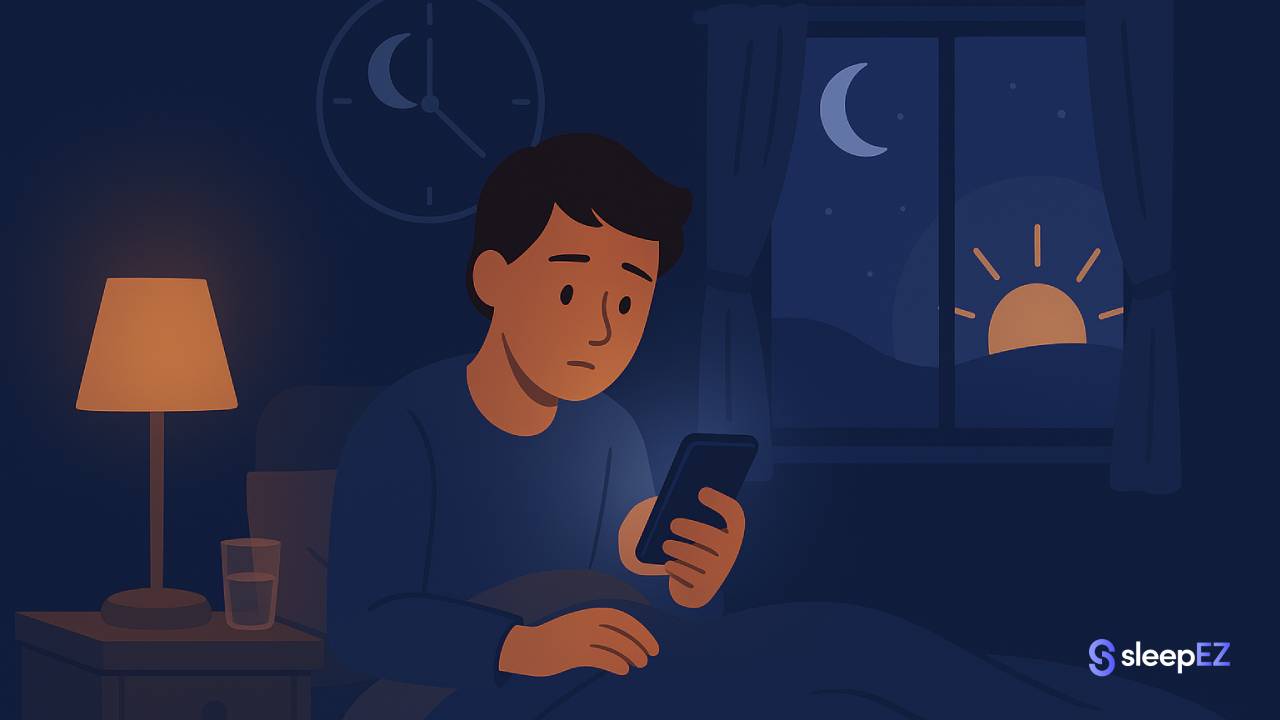Key Takeaways: How Your Sleep Clock Changes With Age
-
It Shifts Earlier: As people age, their circadian rhythm "advances." This is called Advanced Sleep Phase Syndrome (ASPS), causing you to feel sleepy earlier in the evening (7-8 PM) and wake up earlier in the morning (4-5 AM).
-
It Gets Weaker: The signal from your internal clock becomes less robust, leading to more fragmented sleep, waking up more at night, and an increased need to nap.
-
It Starts in Middle Age: These changes often begin to appear in your 40s or 50s and become more pronounced after 60.
What Changes Happen to Your Circadian Rhythm as You Age?
Your body's internal clock doesn't work the same way at 65 as it did at 25. Two major changes happen as you get older, and both affect how and when you sleep.
The Main Change: An "Advanced" Sleep Phase (ASPS)
Advanced Sleep Phase Syndrome is the medical term for becoming an extreme early bird. If you find yourself yawning at 7 PM and wide awake at 4 AM, this is likely what's happening.
Your entire sleep-wake cycle shifts earlier by 2-3 hours. The problem isn't that you can't sleep. It's that your body wants to sleep and wake on a schedule that doesn't match normal life.
This explains why your 70-year-old neighbor is mowing the lawn at dawn. Their body genuinely thinks it's time to start the day.
A Weaker or More "Fragmented" Rhythm
The second change is less obvious but equally frustrating. Your circadian rhythm loses strength.
Think of it like a radio signal. When you're young, the signal is strong and clear. As you age, it gets weaker and harder to pick up. This means:
- You wake up multiple times during the night
- Small noises or temperature changes disturb your sleep more easily
- You feel the urge to nap during the day
- Your sleep feels lighter and less restorative
It's not just about timing anymore. The quality and consistency of your sleep pattern decline.
Why Does Your Internal Clock Change With Age?
Three main factors drive these changes. Some are biological and unavoidable. Others you can influence.
Changes in Your "Master Clock" (SCN)
The suprachiasmatic nucleus (SCN) is a tiny region in your brain that controls your circadian rhythm. As you age, the SCN loses cells and becomes less sensitive to light signals from your eyes.
This weakens its ability to keep a strong, consistent rhythm. The result is a clock that runs earlier and sends weaker signals throughout the day.
Melatonin Production Shifts
Your body produces melatonin, the hormone that makes you feel sleepy. In older adults, melatonin release often starts earlier in the evening.
If melatonin begins flooding your system at 6 PM instead of 9 PM, you'll naturally feel tired earlier. This reinforces the advanced sleep schedule.
Less Light Exposure
This is the factor you can control most. Older adults typically spend more time indoors. They get less bright morning light, which helps set the clock to a later schedule.
At the same time, many older adults are exposed to bright lights at night from TV screens or bathroom trips. This confuses the already-weakened clock, making it harder to maintain any consistent rhythm.
How to Manage Age-Related Sleep Changes
You can't stop your circadian rhythm from changing, but you can work with it instead of against it.
1. Use Light Therapy Strategically
Light is the most powerful tool for adjusting your internal clock.
Get bright light in the afternoon and early evening. This pushes your clock later, helping you stay awake longer and wake up later. Spend 30-60 minutes outside between 4-7 PM, or use a light therapy box.
Avoid bright light in the early morning. If you wake up at 4 AM, don't turn on all the lights. Keep them dim until your desired wake-up time. This prevents reinforcing the early schedule.
2. Maintain a Strict Schedule
Consistency strengthens a weak rhythm. Go to bed and wake up at the same time every day, even on weekends.
Pick times that work with your natural tendency. If your body wants to sleep at 8 PM, fighting it until midnight will backfire. Instead, aim for 9 PM and work with light exposure to gradually shift it later if needed.
3. Practice Excellent Sleep Hygiene
A weaker rhythm means your sleep is lighter and more easily disturbed. You need to control your environment more carefully than you did when you were younger.
Keep your bedroom cool, dark, and quiet. Even small amounts of light or noise can wake you now.
Using tools to control your environment is key. A bluetooth sleep mask can be particularly effective at blocking unwanted early morning light, helping you stay asleep past 4 or 5 AM.
Similarly, silicone earplugs or a sound machine for adults can mask disruptive noises that are more likely to wake you due to lighter, fragmented sleep.
Following a good sleep hygiene routine is essential for managing a fragmented sleep rhythm.
4. Be Smart About Napping
Daytime sleepiness increases with age because of the weaker rhythm. Napping isn't wrong, but do it strategically.
Keep naps short (20-30 minutes) and finish them by early afternoon. Long or late naps make it harder to fall asleep at night, which further weakens your rhythm.
Frequently Asked Questions
At what age does your circadian rhythm change?
Noticeable changes often begin in middle age, around your 40s or 50s. They become more defined in adults 60 and older. The exact timing varies by person.
Why do older people wake up at 5 AM?
This is a classic sign of Advanced Sleep Phase Syndrome (ASPS). The body's internal clock has shifted earlier, causing both sleepiness and wakefulness to happen 2-3 hours earlier than they used to. It's not insomnia. It's a phase shift.
What time should a 70-year-old go to bed?
There is no single right time. The best time is when you naturally feel sleepy. For many 70-year-olds, this may be as early as 7-9 PM, leading to a natural wake-up time of 4-6 AM.
The key is to get 7-9 hours of total sleep. If you go to bed at 8 PM and wake at 5 AM, you've gotten nine hours. That's healthy sleep, even if the timing feels unusual.
Conclusion
Your circadian rhythm changes as you age. This is normal biology, not a sleep disorder.
The clock shifts earlier, the signal gets weaker, and sleep becomes more fragmented. These changes often start in your 40s or 50s and become more pronounced after 60.
While the clock changes, your need for 7-9 hours of sleep does not. You can manage these changes with strategic light exposure, consistent schedules, and better sleep hygiene.
If poor sleep is impacting your quality of life, consult a doctor or sleep specialist. They can rule out other conditions and provide personalized treatment options.



Leave a comment
This site is protected by hCaptcha and the hCaptcha Privacy Policy and Terms of Service apply.